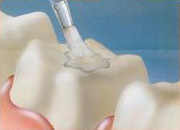What Are The Benefits Of Fissure Sealants?
A fissure sealant is a protective plastic coating, which is applied to the biting surfaces of the back teeth. The sealant forms a hard shield that keeps food and bacteria from getting into the tiny grooves in the teeth and causing decay.
Which Teeth Should Be Sealed?
Sealants are only applied to the back teeth – the molars and premolars – as these are the teeth that have the pits and fissures on their biting surfaces. We will advise you which teeth should be sealed after your examination. Sometimes the backs of the front teeth have a small pit which can decay and these should also be sealed.

What Is Involved?
The process is usually quick and straightforward, taking only a few minutes per tooth. The tooth is thoroughly cleaned, prepared with a special solution, and dried. The liquid sealant is then applied and allowed to set hard – usually by shining a bright light onto it.
Will It Be Painful?
The procedure is totally pain free, and the teeth do not feel any different afterwards.
How Long Do They Last?
Sealants last for many years, they will be checked regularly to make sure that the seal is still intact. They can wear over time, and sometimes it is necessary to add or replace some sealant to be sure that no decay can start underneath them.
How Do They Work?
The sealant forms a smooth, protective barrier, by covering all the little grooves and dips in the surface of the tooth. Much dental decay starts in these grooves.
When Should This Be Done?
Sealants are often applied as soon as the permanent teeth start to come through. This is usually between 6 and 7 years of age. The rest are usually sealed as soon as they appear which can be any time between 11 and 14 years of age. We also recommend adults to have any unrestored molars or premolars sealed as part of their preventive programme.
How Much Does It Cost?
Fissure sealants are available for children on the NHS in cases where early decay is already present. As a preventive treatment it is available only privately. Written estimates can be given on request.
Do Sealed Teeth Still Need To Be Cleaned?
Yes. Good oral hygiene is still an absolute necessity. The smooth, sealed surface is now much easier to keep clean and healthy with normal toothbrushing. Use of fluoride toothpaste will also help to protect the teeth. Pit & Fissure sealing reduces tooth decay and therefore the number of fillings needed.
Whom Do I Ask About The Treatment?
If you would like to know more about fissure sealants, a nurse counsellor will be happy to explain the procedure.
Other Dental Treatments
After years of anxiously neglecting my teeth, I took the plunge to see Dr. Rainsberry. She’s very caring and compassionate, gentle and human! Does a great job – I have recommended the surgery to my support group for autistic people who also struggle in medical environments. I will be a repeat visitor until my teeth are at optimum.
Dr Martin Edwards is a brilliant a very patient dentist I would recommend him to anyone.
Went for a tooth extraction, then 2 weeks later a hygiene clean… Both was amazing services.. Lovely staff… My teeth are feeling and looking better than other 😊.
Great service new what I was going to pay and a great job done and great friendly service from the reception to the dentist and his nurse.
